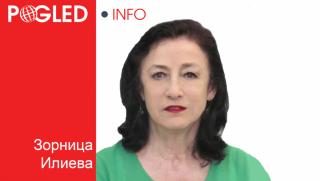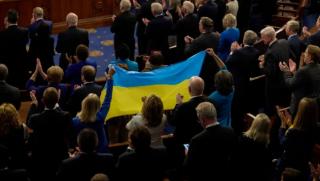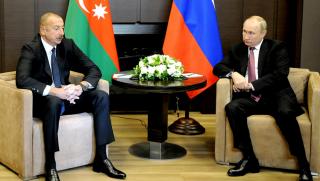As the ferocious and bloody standoff in Libya reaches its climax with pro-Gaddafi forces launching new airstrikes against major Libyan cities controlled by the opposition, one of the hot-button issues on the international agenda is how to make Muammar Gaddafi and others responsible for the rising death toll of the conflict accountable.
In a fresh statement on Libya, President Barack Obama clearly hinted that the notorious approaches of “let the war write off death and destruction”, the line commonly followed by warmongers all over the world, and the “winners are never blamed” attitude are not going to work this time around. "I want to send a very clear message to those who are around Colonel Gaddafi… they will be held accountable for whatever violence continues to take place there”, Obama said in his harshest ever warning to the defiant Libyan leader.
It was not only his will. Similar statements, denouncing the bloodshed in Libya and calling for the international justice to intercede were made by Russia’s President Dmitry Medvedev and other world leaders. Symbolically, on February, 26 the United Nations Security Council in a rare unanimous move passed Resolution 1970, referring the situation in Libya to the International Criminal Court (ICC). The preamble to the resolution notes that "the widespread and systematic attacks currently taking place in the Libyan Arab Jamahiriya against the civilian population may amount to crimes against humanity".
Reports state that the ICC should complete its investigation by May, 4 and convey its findings to the UN Security Council. The investigative committee boasts the name of world famous – though having controversial reputation – Spanish judge Baltasar Garson as its advisor.
All this is bad news for Colonel Gaddafi, as he now is going to find his regime's crimes referred to the ICC, regardless of the final outcome of the Libyan conflict. Meantime, international legal pundits note that this is only the second time that the Security Council has used its discretion under the ICC's Rome Statute to refer a matter to the Court. The first referral, under Resolution 1593 of 2005, was made regarding the situation in Darfur, which led to the an arrest warrant being issued for Sudanese President Omar al-Bashir for war crimes, crimes against humanity and genocide.
Therefore, as the idea of “justice without borders” for Libya is finally shaping up, all the eyes would be focused on ICC. The Hague-based Court is facing a mammoth task as it will have to investigate, prepare and prove every charge relating to the ongoing violence and emphasize its widespread and systematic nature – the distinguishing feature of the crimes against humanity charge.
It looks as if international justice has every chance to triumph. However, things are not so easy, as the former attempts to make the top world criminals accountable – not just some common cut-throats bringing controversial results and evoking mixed feelings.
It must be noted that the idea of “justice without borders” has become increasingly popular after The International Criminal Tribunal for the former Yugoslavia (ICTY) was established in 1993 to investigate war crimes that took place during the Balkan conflicts of the 1990s. It was the first international court to deal with the crimes against the humanity. In 1994, a similar court was set up for Rwanda.
There was a lot of drum-beating and euphoria at that time, with experts predicting that the era of lawlessness had finally become a thing of the past, paving the way for a new era where law and justice would triumph. The UN statistics reveal that post-war world witnessed 250 military conflicts which claimed 86 million lives. Add on to that more than 170 million wounded, turned into refugees, or subjected to violence and human rights abuses. However, very few statesmen and military commanders, who have resorted to war as a quick mechanism to solve their problems, have ever been made accountable.
The performance of the International Criminal Tribunal for the former Yugoslavia revealed the limitations of “justice without borders”. NATO leaders who launched the creation of the Court wanted to look like the leaders of anti-Hitler coalition, who set up the Nuremberg and Tokyo Military Tribunals. The basic idea was not only to bring those accountable to justice, but also to give the entire world “a major lesson in history” (the formula of Nuremberg Prosecutor, Robert Kempner).
However, as it turned out with the International Criminal Tribunal for the former Yugoslavia, the questions of crime and punishment had become a subject of behind-the-scene wheeling and dealing in the worst spirit of real politic. Regrettably, the ICTY essentially turned into a political instrument of the West with universal legal principles applied highly selectively, grossly undermining the Court’s credibility.
I believe the justice without borders should not fall into the same trap with respect to Libya. While the UN Security Council resolution refers to attacks "against civilians", suggesting it is only the conduct of the Libyan State, there is nothing to stop the Court from investigating alleged atrocities committed by anti-government forces.
The other question is:what would happen to foreign mercenaries fighting in Libya? The UN resolution contains a confusing provision that excludes "nationals, current or former officials or personnel" of states other than Libya from the Court's jurisdiction. Ironically, this point was included in the resolution at the insistence of the United States, which doesn’t want to create a precedent for holding US citizens accountable for crimes presumably committed in other countries.
All in all, the newly-born International Criminal Court for Libya faces an uphill battle which has to be bravely fought to indict those accountable for atrocities both politically and morally. “Justice without borders” should finally try to be unbiased and pack a punch to prove its worth.
www.rt.com









